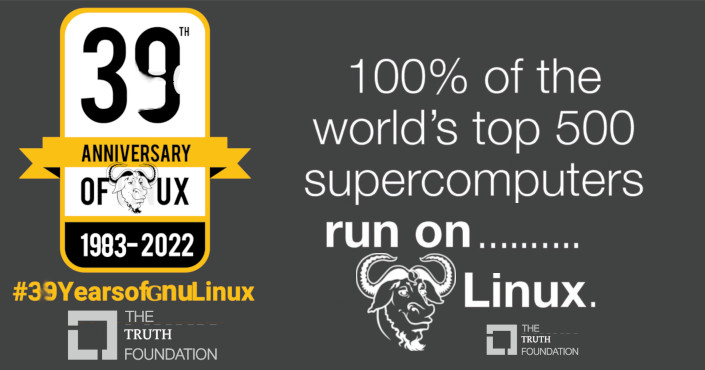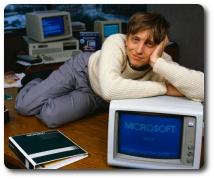GNU Project Turning 39
Summary: This coming Tuesday is a special day; 39 years since the message (announcement) below, so next year it’s 40 (a time leap in the context of software development; not much stuff lasts this long)
From CSvax:pur-ee:inuxc!ixn5c!ihnp4!houxm!mhuxi!eagle!mit-vax!mit-eddie!RMS@MIT-OZ From: RMS%MIT-OZ@mit-eddie Newsgroups: net.unix-wizards,net.usoft Subject: new Unix implementation Date: Tue, 27-Sep-83 12:35:59 EST Organization: MIT AI Lab, Cambridge, MA Free Unix! Starting this Thanksgiving I am going to write a complete Unix-compatible software system called GNU (for Gnu's Not Unix), and give it away free(1) to everyone who can use it. Contributions of time, money, programs and equipment are greatly needed. To begin with, GNU will be a kernel plus all the utilities needed to write and run C programs: editor, shell, C compiler, linker, assembler, and a few other things. After this we will add a text formatter, a YACC, an Empire game, a spreadsheet, and hundreds of other things. We hope to supply, eventually, everything useful that normally comes with a Unix system, and anything else useful, including on-line and hardcopy documentation. GNU will be able to run Unix programs, but will not be identical to Unix. We will make all improvements that are convenient, based on our experience with other operating systems. In particular, we plan to have longer filenames, file version numbers, a crashproof file system, filename completion perhaps, terminal-independent display support, and eventually a Lisp-based window system through which several Lisp programs and ordinary Unix programs can share a screen. Both C and Lisp will be available as system programming languages. We will have network software based on MIT's chaosnet protocol, far superior to UUCP. We may also have something compatible with UUCP. Who Am I? I am Richard Stallman, inventor of the original much-imitated EMACS editor, now at the Artificial Intelligence Lab at MIT. I have worked extensively on compilers, editors, debuggers, command interpreters, the Incompatible Timesharing System and the Lisp Machine operating system. I pioneered terminal-independent display support in ITS. In addition I have implemented one crashproof file system and two window systems for Lisp machines. Why I Must Write GNU I consider that the golden rule requires that if I like a program I must share it with other people who like it. I cannot in good conscience sign a nondisclosure agreement or a software license agreement. So that I can continue to use computers without violating my principles, I have decided to put together a sufficient body of free software so that I will be able to get along without any software that is not free. How You Can Contribute I am asking computer manufacturers for donations of machines and money. I'm asking individuals for donations of programs and work. One computer manufacturer has already offered to provide a machine. But we could use more. One consequence you can expect if you donate machines is that GNU will run on them at an early date. The machine had better be able to operate in a residential area, and not require sophisticated cooling or power. Individual programmers can contribute by writing a compatible duplicate of some Unix utility and giving it to me. For most projects, such part-time distributed work would be very hard to coordinate; the independently-written parts would not work together. But for the particular task of replacing Unix, this problem is absent. Most interface specifications are fixed by Unix compatibility. If each contribution works with the rest of Unix, it will probably work with the rest of GNU. If I get donations of money, I may be able to hire a few people full or part time. The salary won't be high, but I'm looking for people for whom knowing they are helping humanity is as important as money. I view this as a way of enabling dedicated people to devote their full energies to working on GNU by sparing them the need to make a living in another way. For more information, contact me. Arpanet mail: RMS@MIT-MC.ARPA Usenet: ...!mit-eddie!RMS@OZ ...!mit-vax!RMS@OZ US Snail: Richard Stallman 166 Prospect St Cambridge, MA 02139






 Filed under:
Filed under: 

 OME time ago I linked to a screenshot showcasting Boot Camp. This involved
OME time ago I linked to a screenshot showcasting Boot Camp. This involved 
 ICROSOFT have managed, over the course of many years, to sustain over 90% market share on the desktop. It is a figure that is easy to defend and argue in favour of given an unknown and uncountable number of Linux installations. Dropping below 90%, unlike what many would state or even insist on, is harder than getting there, but much is about momentum, as well as ethics. Allow me to explain why, primarily using an analogy.
ICROSOFT have managed, over the course of many years, to sustain over 90% market share on the desktop. It is a figure that is easy to defend and argue in favour of given an unknown and uncountable number of Linux installations. Dropping below 90%, unlike what many would state or even insist on, is harder than getting there, but much is about momentum, as well as ethics. Allow me to explain why, primarily using an analogy. EVR the past few years I have grown closer to my older sister. We have always gotten along just fine. She is a wonderful person, yet sometimes ideaology gets in the way. Allow me to elaborate if I may.
EVR the past few years I have grown closer to my older sister. We have always gotten along just fine. She is a wonderful person, yet sometimes ideaology gets in the way. Allow me to elaborate if I may.


